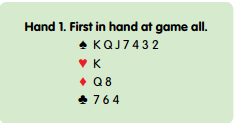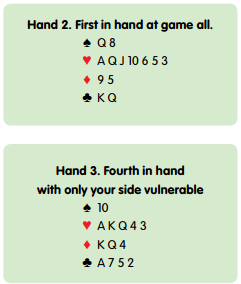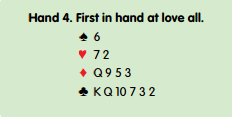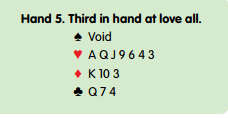Source: Mr Bridge

If you open at the three level or higher, you make life harder for the opposition than you do opening at the one level. You also reduce partner’s options and remove the option of playing at a lower level. Which is better depends upon the relative offensive and defensive strength of your hand together with your position at the table and the vulnerability. Values outside your long suit, other than aces, tend to be defensive in nature. A strong long suit is offensive.
Distribution – singletons and voids are generally offensive in nature too. The higher the offensive to defensive strength potential of your hand, the more attractive it is to pre-empt. The best position to pre-empt is in third seat. If your partner cannot open, the chance that you are making life tough for the opponents rather than your partner increases. First seat, when either opponent might hold a good hand, is the next best position. Second seat, when partner is just as likely to hold a good hand as the other opponent, is the worst position. Even aggressive bidders who take various liberties in first or third seat tend to go by the textbook in second seat.
The textbook standard for a 3-level preempt is 5-9 HCP and a seven-card suit. The best vulnerability to pre-empt is when only the other side is vulnerable. Any penalty you concede is likely to be lower than the value of any game or slam their way. The opponents are also least likely to double you when only they are vulnerable and most likely to allow you to push them to a level at which you might defeat them. Let us begin with some example hands sent in by a reader, Alan Cooke.


On Hand 1, I recommend opening 1 . You have 11 high-card points – enough for a one-level opening. The vulnerability – game all – is not particularly conducive to pre-empting. Moreover, almost half your high cards are in your short suits. Remember, values in your short suits, especially secondary values and most of all unguarded honours, are more likely to take tricks defending than as declarer. At the table, the dealer opened 4
. You have 11 high-card points – enough for a one-level opening. The vulnerability – game all – is not particularly conducive to pre-empting. Moreover, almost half your high cards are in your short suits. Remember, values in your short suits, especially secondary values and most of all unguarded honours, are more likely to take tricks defending than as declarer. At the table, the dealer opened 4 and lost 800 for a terrible score.
and lost 800 for a terrible score.
It would be more attractive to preempt (with 3 rather than 4
rather than 4 ) if the red suit holdings were a small singleton and a small doubleton. I suppose you might still lose 800 if partner has a bust but the opponents might then have a slam available.
) if the red suit holdings were a small singleton and a small doubleton. I suppose you might still lose 800 if partner has a bust but the opponents might then have a slam available.
On Hand 2, again I recommend opening at the one level: 1 . As on Hand 1, you have a lot of values – in this case a full half – in your short suits. Moreover, with 14 points in high cards and some fast defensive winners, you have relatively little to fear from allowing the opponents into the auction. The 7222 shape is also a downer for pre-empting. At the table, a 4
. As on Hand 1, you have a lot of values – in this case a full half – in your short suits. Moreover, with 14 points in high cards and some fast defensive winners, you have relatively little to fear from allowing the opponents into the auction. The 7222 shape is also a downer for pre-empting. At the table, a 4 opening was not success. Give the hand a void in spades rather than the actual Q-x and it would be far more attractive to open at a higher level – you would then have a good reason to try to keep the opponents out (stopping them from finding a spade fit) while you would have fewer losers in 4
opening was not success. Give the hand a void in spades rather than the actual Q-x and it would be far more attractive to open at a higher level – you would then have a good reason to try to keep the opponents out (stopping them from finding a spade fit) while you would have fewer losers in 4 .
.
Hand 3 is no misprint. I have included it because, at the table, the winning action would have been to open 4 . The actual 1
. The actual 1 opening allowed the opponents to get together to sacrifice in 4
opening allowed the opponents to get together to sacrifice in 4 doubled (down only 300 against a vulnerable game). While it is true that you might open 4
doubled (down only 300 against a vulnerable game). While it is true that you might open 4 if you had committed an infraction that silenced your partner for the auction (like opening out of turn), all sorts of possible contracts could be right. If you do not have a heart fit, 3NT could be right. Even facing a passed partner, a slam in one of the minor suits remains possible. You really cannot open 4
if you had committed an infraction that silenced your partner for the auction (like opening out of turn), all sorts of possible contracts could be right. If you do not have a heart fit, 3NT could be right. Even facing a passed partner, a slam in one of the minor suits remains possible. You really cannot open 4 on the off chance that the opponents have – and find – a profitable sacrifice.
on the off chance that the opponents have – and find – a profitable sacrifice.
Let us conclude with some hands on which pre-empting is sensible:

You should open 3 . You have very little defence against the majors but fair playing strength yourself. Make the opponents start at the three level.
. You have very little defence against the majors but fair playing strength yourself. Make the opponents start at the three level.

Open 4 . You have little defence against a spade contract and the chance of missing a slam facing a passed partner is low. You might open this hand 4
. You have little defence against a spade contract and the chance of missing a slam facing a passed partner is low. You might open this hand 4 in first seat or at other vulnerabilities – doing so is clear cut in third seat.
in first seat or at other vulnerabilities – doing so is clear cut in third seat.
Esta entrada también está disponible en: Spanish

